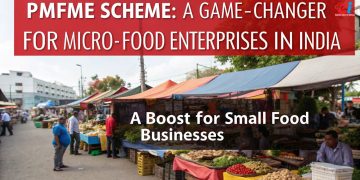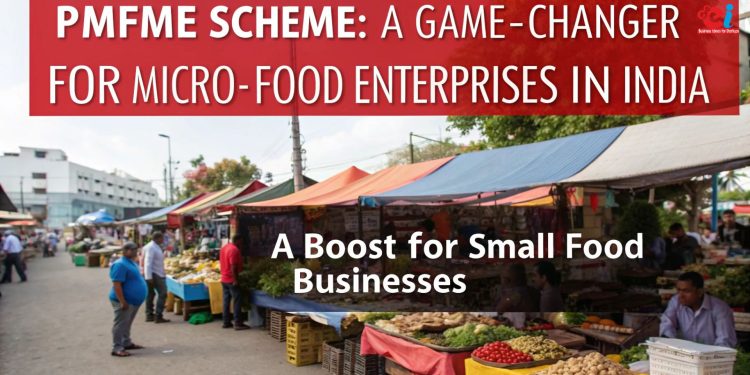The agro-industrial sector of India is changing for the better due to government initiatives that are aimed at the bottom of the economic pyramid. One of the initiatives that stand out is the Pradhan Mantri Formalization of Micro Food Processing Enterprises PMFME Scheme.
It is a Centrally Sponsored Scheme of PMFME scheme launched in June 2020. It aims to support micro food processing units through formalization, skill development, and credit linked social security schemes.
It works towards the goals of ‘Vocal for Local’ or ‘Atmanirbhar Bharat’, seeking to reach up to 2 lakh micro food processing businesses and providing them financial assistance, institutional support, and better infrastructure facilities.
PMFME Scheme Overview
- Launch: June 2020
- Ministry: Ministry of Food Processing Industries (MoFPI)
- Total Outlay: ₹10,000 Crore (for 5 years till 2024-25)
- Coverage: 2 lakh micro-enterprises
Related: The Agriculture Sector in India
Key Objectives
- Improve formalization in the unorganized micro food processing industry
- Increase the level of productivity and fuel competition within the sector
- Improve access to technology, branding, and marketing support
- Implement the One District One Product (ODOP) model
Target Beneficiaries
- Individual Micro Food Entrepreneurs
- Self Help Groups (SHGs)
- Farmer Producer Organizations (FPOs)
- Cooperatives
Importance of Micro Food Processing Enterprises
Micro food enterprises constitute over 66% of India’s food processing sector. However, most are unorganized, home-based units, facing challenges like:
- Lack of formal credit
- Outdated processing technology
- Poor branding and marketing
- Regulatory non-compliance
As per the MoFPI Annual Report 2023–24, there are more than 25 lakh unincorporated food processing units across India.
PMFME is central to upgrading them for better income and food safety.
Related: Launch Your Profitable Food Processing Business
PMFME Achievements (as of March 2024)
| Indicator | Achievement |
| SHG Members Provided Seed Capital | Over 1,00,000 |
| ODOP Products Identified | 137 Products in 713 Districts |
| Incubation Centers Approved | 75 |
| State Level Technical Institutes (SLTIs) | 10+ Supported |
| Total Grants Disbursed | ₹1,707 Crore+ |
Special Mention: In 2023-24, 37 all-women Self Help Groups were supported, highlighting the scheme’s emphasis on women-led enterprises.
One District One Product (ODOP) – A Strategic Pillar
PMFME employs the ODOP framework to foster a product-centric approach by district. Examples:
- Mango – Malihabad (UP)
- Turmeric – Erode (Tamil Nadu)
- Litchi – Muzaffarpur (Bihar)
ODOP Highlights
- Products Identified: 137
- Districts Covered: 713
- GIS Portal: odop.mofpi.gov.in
This enhances scale, branding, and value-chain support.
Skill Development and Capacity Building
More than 50,000 entrepreneurs have benefited from over 1,200 training sessions, including:
- Achieving product standardization as well as FSSAI compliance
- Branding and marketing
- Preparing business plans
- Innovative packaging
Training Partners
- NIFTEM-K
- NIFTEM-T
- FICSI (Food Industry Capacity & Skill Initiative)
Market Outlook & Growth Forecast
India’s food processing industry is forecasted to grow at a CAGR of 6.5% from $407 billion in 2023 to $535 billion by 2027. Key growth drivers:
- Urbanization along with increasing disposable incomes
- Growth in the export market for processed products
- Support from the government along with improvement in infrastructure
GVA Contribution of Food Processing (₹ Lakh Cr)
| Year | GVA by FPI | % of Manufacturing GVA |
| 2018-19 | 2.36 | 10.13% |
| 2021-22 | 1.90 | 7.40% |
| 2022-23 | 1.92 | 7.66% |
(Source: MoFPI Annual Report 2023-24)
For more information check our related videos on Food Processing
India’s Export Advantage
In 2023-24, India’s exports of processed food amounted to $10.88 billion, which is 23.4% of the total export of agricultural and food products.
This includes:
- Ready-made meals and packaged goods
- Dairy, meat, agricultural, and domestic spices
- Packaged and processed vegetables
Implementation Issues
While there are notable accomplishments, the PMFME scheme is held back by:
- Subsidy disbursements because of bank delays
- Lack of localized infrastructural assistance
- Insufficient micro-level awareness programs and limited digital access
Recommendations
- Strengthening State Level and District Level Project Application Units (SLPUs, DLPUs)
- Increase promotional activities for ODOP e-commerce sales (e.g. ONDC, Amazon Karigar)
- Streamline partner bank loan approval processes
How NPCS Aids Food Entrepreneurs
NPCS works with aspiring food entrepreneurs, aiding them with:
- Comprehensive market surveys alongside detailed reports on tech-economics
- Plans for raw materials, manufacturing processes, and plant layouts
- Financial modeling alongside return on investment forecasts
As a trusted partner, NPCS’s three decades of experience allows it to help with project evaluation through government schemes such as PMFME.
Conclusion
The PMFME scheme helps formalize the micro food sector in India and empowers small-scale businesses. The scheme is holistic, tackling issues of excess food waste alongside rural unemployment, especially among the female demographic.
Micro-enterprises fortified by the PMFME scheme will be a critical asset for self-reliant and food independent India as we strive towards a 5 trillion economy.


















